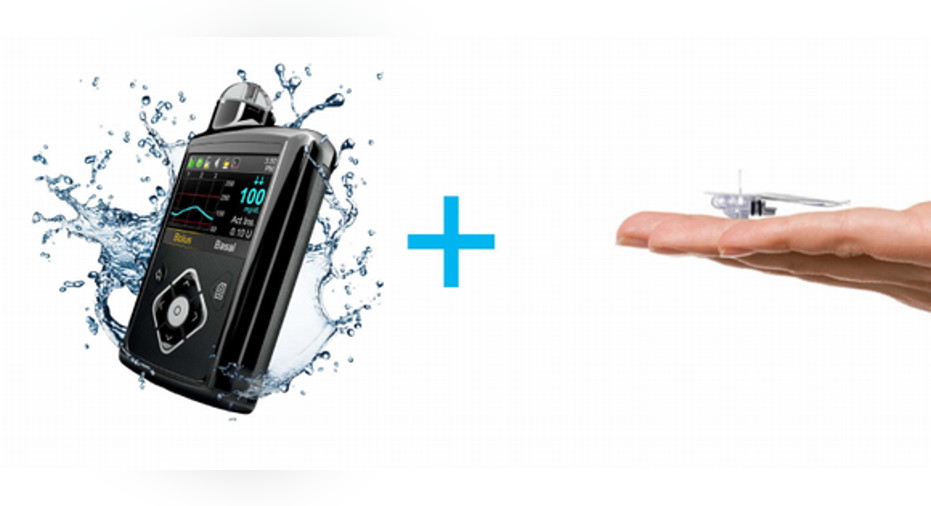How DexCom Can Fight Back Against Medtronic's Artificial Pancreas

Image source: Medtronic plc.
Medtronic plc(NYSE: MDT) got an FDA green-light last week to begin marketing its artificial pancreas, the MiniMed 670G, and management is planning to launch the device early next year. Will the 670G dent demand for DexCom's (NASDAQ: DXCM) continuous glucose monitors in 2017? Read on to find out how DexCom plans to keep growing.
A game-changing innovation
Insulin is a hormone produced in the pancreas that is used to break down sugar into energy.However, in 1.25 million Americans who are diagnosed with type 1 diabetes, the pancreas fails to produce insulin, forcing patients to monitor their blood sugar levels and dose themselves insulin as necessary.
The burden associated with managing type 1 diabetes is heavy, and as a result, most diabetics' blood sugar levels are out of the desired range most of the time. That's worrisome because blood sugar highs and lows can lead to life-threatening illnesses, such as heart disease.
To reduce the risk of blood sugar highs and lows, Medtronic developed the 670G, a system that uses a blood glucose sensor, an insulin pump, and an infusion patch to automatically keep a type 1 diabetes patient's blood sugar levels on target.
Once patients program their information into the device, the 670G manages insulin levels by automatically checking blood sugar every five minutes and dosing insulin at the appropriate levels when needed. Mealtime insulin doses are automatically calculated based on each patient's programmed insulin to carbohydrate ratio and the amount of carbohydrates that will be eaten.
Image source: DexCom.
Upcoming threat
Until now, DexCom's continuous glucose monitors (CGM) have been the biggest advance in type 1 diabetes treatment. The company's latest-generation CGM, the G5, automatically streams blood glucose levels to a patient's device or smartphone, and by charting blood sugar peaks and valleys, patients canbetter control their disease.
The advantages of CGMs have been a boon to DexCom and its investors. The company's sales jumped47% year over year and 18% quarter over quarter to $137 million in Q2.
However,DexCom's rapid growth could come under pressure if Medtronic's G70 hits the ground running next spring. That's because the G70 uses Medtronic's own CGM and sensors, not DexCom's.
Navigating the threat
Fortunately for DexCom, the risk posed by the G70 may not last long. Sales headwinds won't be felt until after the G70 launch early next year, and until the device wins EU approval, DexCom should be able to keep growing its international sales rapidly.DexCom's international revenue was $18 million in Q2, up 45% from a year ago.
If theG70 launch does go off without a hitch, DexCom's type 1 market share will only take a hit in adults. Initially, the G70 is only approved for use in patients aged 14 and up. Most type 1 patients are adults, but roughly 200,000 patients are younger than 18, and ostensibly, many of those patients are younger than 14.
DexCom could begin to win back any market sharelost to the G70 in relatively short order if collaborations with Medtronic's competitors pan out. DexCom is sharing its technology with various insulin pump makers that are developing their own artificial pancreases, includingInsulet, Animas (a Johnson & Johnson company), Tandem, and the privately-held Bigfoot biomedical, which was founded by Jeffrey Brewer, the former CEO of JDRF International, a global type 1 diabetes advocacy group.
Insulet plans to begin clinical trials for its artificial pancreas this year, and it's eyeing potential commercialization in 2018; Tandem also hopes to begin clinical trials this year, and it's targeting a launch in late 2017;and Bigfoot biomedical just enrolled its first patient in a clinical trial.
In addition to those high-profile relationships,DexCom has teamed up with Alphabet's life sciences spin-off Verily on next-generation diabetes technology. Verily is amassing a team of leaders in diabetes research, and it recently hired Insulet's Howard Zissler, who helped spearhead Insulet's artificial pancreas program.
Tying it together
Medtronic's first-to-market advantage might be short-lived, and the impact on DexCom's growth will depend a great deal on the official launch date of the G70 and how quickly DexCom's partners get their similar systems through the FDA.
Assuming that its partners are successful in developing a competing product, I think that the artificial pancreas market could support multiple players -- and that's good news for DexCom, given its system agnostic approach.Forty thousand Americans are newly diagnosed with type 1 diabetes annually, and up to 5 million Americans may be living with type 1 diabetes by 2050.
Overall, thecoming year could be one of transition in the type 1 treatment space, and that could mean that DexCom's shares experience more than their fair share of volatility. If that volatility includes a drop in the company's share price, then I'll be looking for a chance to buy for the long haul.
A secret billion-dollar stock opportunity The world's biggest tech company forgot to show you something, but a few Wall Street analysts and the Fool didn't miss a beat: There's a small company that's powering their brand-new gadgets and the coming revolution in technology. And we think its stock price has nearly unlimited room to run for early in-the-know investors! To be one of them, just click here.
Suzanne Frey, an executive at Alphabet, is a member of The Motley Fool's board of directors.Todd Campbellhas no position in any stocks mentioned.Todd owns E.B. Capital Markets, LLC. E.B. Capital's clients may have positions in the companies mentioned.Like this article? Follow him onTwitter where he goes by the handle@ebcapitalto see more articles like this.The Motley Fool owns shares of and recommends Alphabet (C shares). The Motley Fool owns shares of Medtronic. The Motley Fool recommends Insulet and Johnson and Johnson. Try any of our Foolish newsletter services free for 30 days. We Fools may not all hold the same opinions, but we all believe that considering a diverse range of insights makes us better investors. The Motley Fool has a disclosure policy.



















